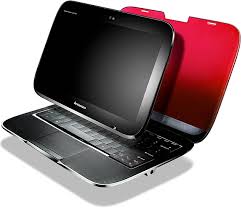 When some of the first tablet PCs came out, they were heavy and expensive. Some are still heavy and expensive, but the tablet PC market has certainly shrunk. Slate tablet PCs are rare and we see the vast majority of people using laptops or convertible tablets. Several U.S. medical schools require medical students to use a Lenovo ThinkPad X200 tablet PC. Sorry, but if you're an Apple fan, you'll need to use a PC if you're in one of those schools.
When some of the first tablet PCs came out, they were heavy and expensive. Some are still heavy and expensive, but the tablet PC market has certainly shrunk. Slate tablet PCs are rare and we see the vast majority of people using laptops or convertible tablets. Several U.S. medical schools require medical students to use a Lenovo ThinkPad X200 tablet PC. Sorry, but if you're an Apple fan, you'll need to use a PC if you're in one of those schools.So, how has the tablet PC evolved in the health care industry?
- One of the major changes occurred when we lost the Apple Newton MessagePad. Doctors (early adopters of technology) who used the Newton were devastated. What do we use now?
- Some physicians tried using slate tablets, but at the time, many electronic health record (EHR) software solutions were not really optimized for tablets and pen-based input.
- Some manufacturers created slate-style tablet PCs that detached from a keyboard base. Remember the HP TC1000 and TC1100?
- Then, physicians turned to convertible tablets, but most physicians simply used these as laptops because they were more comfortable with the keyboard and mouse.
- Then, nurses and other clinicians started using Mobile Clinical Assistants in the hospital setting. These devices were versatile, thanks to their built-in RFID and barcode scanners. The Motion C5 and Panasonic H1 became quite popular, despite their high price tags.
- Many PC manufacturers gave up on the slate tablet industry. It was simply too niche.
- Additional PC manufacturers gave up on the convertible tablet industry.
- The concept of the ultra-mobile PCs flopped. The origami campaign was dead.
- Then, netbooks started gaining popularity and Asus created a convertible tablet netbook.
- Lenovo introduced a hybrid tablet/notebook with the IdeaPad U1 hybrid.
- HP teased the world with the HP Slate.
- Now, Apple (and others like HP and Lenovo) may be revolutionizing the slate industry by introducing slate-style devices like the iPad. If health care professionals start becoming more comfortable with a slate form factor, will this translate over to pen-based computing? Will we be more inclined to navigate directly on the screen of a device instead of using a mouse and keyboard?

Not to pile-on, but our new Toughbook C1 convertible tablet was build specifically based upon feedback from our healthcare customers.
ReplyDeleteFrom our experience, healthcare customers love touchscreens. Many of the major healthcare applications are primarily "point and click", lending themselves to usage on a touchscreen/tablet. Healthcare customers like the idea of a tablet, being able to take patient signatures, etc--even if the majority of users are still tied to their keyboards.
More than anything, users like to have that flexibility. Users are unique--and they access their computing devices in many different ways. They like to feel that they're in charge of their user experience--and not dictated by the form factor. I think this is one of the main reasons that the convertible tablet form factor is one of the leading form factors these days.